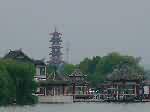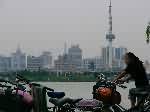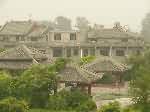- Getting around Lijiang. Dont stay in the Old Towns more than 2 days, there is nothing to do. KRISS Oct 9, 2013 05:46
- 2013 Beijing Temple Fair BENNYLAU Feb 26, 2013 03:29
- Malaysian traveling from KUL - LAX vis Shanghai PVG ZATI_DY Jan 3, 2013 20:15
Pioneering - Surprise Travel Rewards in Xuzhou
- Views: 5009
- |Vote: 0 0
- |Add to Favorites
- |Recommend to Friends
The Challenge
One of the most interesting challenges of travelling is keeping up interest itself - because at times, the noteworthiness of the attractions you’re visiting depends on your own enthusiasm for travel on that particular day. Wandering up the slopes of the magnificent Huang Shan can be a terrible bore if you’re hot, carrying too many things and beginning to form the opinion that mountains aren’t all they’re made out to be. If you’ve seen five temples this week, visiting another might be a considerable bore, and even the Great Wall itself can seem like a pile of bricks on a bad day.
So here’s a challenge for the China enthusiast – try going somewhere entirely without any reputation as a tourist spot and see if you can make it worth the visit. After all, before travel in China became an industry, that’s how the pioneering backpackers did it, taking trains to random cities and seeing what they could find. There are still plenty of places in China that the outside world hasn’t yet heard of, and heading for one of them can give you the feeling you’re breaking new ground.
On this particular trip, I was looking for precisely such a location, and from a short list I selected Xuzhou in the North of Jiangsu province. Part of the reason for visiting Xuzhou was that even the Chinese people I asked seemed to think it was an unusual choice, and everyone I brought up the subject with advised me it wasn’t worth my while, and that it would be best not to go. Not one to take the casual advice of strangers who’ve never been to the place they’re talking about, I bought a ticket and set out.
It’s not as if Xuzhou couldn’t be a tourist venue – a clean, prefecture level city on the waters of Yunlong lake, Xuzhou is the birthplace of the great Han dynasty, the period of Chinese history that perhaps gave rise to the concept of being Chinese itself: it’s from this dynasty that Chinese people still call themselves the Han, and the Chinese language in Mandarin is still called ‘Han speech’. In recent history, it was the site of the last great military campaign in the Chinese Civil War, where PLA forces under Deng Xiao Ping cut off the Nationalist elite forces from command in Nanjing and squeezed a victory out of the battle with outmatched troops and inferior equipment. Given that Xuzhou is a convenient transport hub for the entire region, being at the corner of four provinces – Jiangsu, Henan, Anhui and Shandong (Xuzhou was actually part of Shandong province until recent times), and that it has express direct train links with Shanghai, Beijing, Zhengzhou and Jinan, it would make sense that travellers might choose to stop off and take a look as they pass through. For whatever reason, they generally do not. I wanted to discover if this lack of attention was deserved, or in fact a great pity for these passengers slipping the place by.
To the Lake
My first impressions of Xuzhou were that the masses were right: I arrived on a gray, muggy morning, and the square around the station front was drab and uninspiring. I’d been told that Xuzhou is a coal mining town, and at the time it looked like one. I hauled my case across the muddy puddles and checked into the closest hotel I could find, not particularly minding that it was a touch more expensive than I usually prefer. I waited out the rain in a dimly lit room, exhausted after a sleepless overnight journey on a Beijing train that was two and a half hours late.
I wandered outside at around midday – the sky was still overcast, but the rain had dried out. I decided to take a brisk walk out from the station and see what I could find.
The first place of interest I discovered was what is called the ‘Ancient Path of the Yellow River’. It’s the river that flows through the town, along the bed of what indeed used to be the great Yellow River. Despite being the mother of Northern Chinese Civilisation, it’s easily the most dangerous river in China, and has shifted its course several times in the last thousand years, blocking itself with its excessive sedimentary deposits of silt, which is what gives it its yellow colour in the first place. About a hundred or so years ago, it heaved its great neck to the North and now flows out to the Yellow Sea via Jinan, the capital of Shandong province. It is an indiscriminate creature that destroys hundreds and thousands of lives whenever it moves like this or even shudders over its banks, but not far away from Xuzhou it was once unleashed as a weapon – Chiang Kaishek of the Nationalist army ordered the river’s stopgates to be broken so as to flood out advancing Japanese troops. Chiang’s vision was too limited to grasp the might of the demon he’d set loose – nine hundred thousand Chinese lives were lost in the rage of the uncontainable flood.
Over the bridge, I began to enjoy the look of Xuzhou. I was entering the central city area close to Pengcheng Square, surrounded by attractive new stores and where the construction of a new, gorgeous fountain was taking place. Pengcheng is the original name for Xuzhou, dating back even earlier than the Han dynasty, when it was the capital of the state of Chu. The name lives on in various businesses throughout the town, including the excellent Pengcheng beer that’s brewed in a Qingdao-owned brewery not far away from the center of Xuzhou. Xuzhou is clearly a city enjoying new prosperity, but I still had to answer my question about its interest value as a tourist destination. With that thought in mind, I headed for the city’s lakeside district at Yunlong Shan.
It was a misty afternoon, and it seemed as if the clouds of thick steam were rising directly out from the cold, still surface of Yunlong Lake. From the shade of thickly leaved trees, I could see the central city in smart relief against the low cloud, crowned by the attractive Xuzhou TV Tower in Swallow Tower Park, resembling the Oriental Pearl Tower in Shanghai with a single silver orb at its center. In the middle of the lake, the Xuzhou Aquarium has been designed to look like the tail fin of a diving whale. People were stripping to their shorts in the sweaty mist to jump into the lake waters for a swim, and the air was full of dragonflies, which always fly closer to the ground when the rains are coming. Behind me was the Yunlong Mountain range, a short series of connected forested peaks so-called because they resemble the back of a dragon (long) playing in the clouds (yun). I walked along the lake’s edge until I reached the simple pagoda I’d seen from a distance, the Jinshan Tower. It was under repair when I visited it, but a local told me it was genuinely an historic building and had been there ever since she was very young when none of Xuzhou’s other developments had yet been made. Standing in the pine forest beside the lake, I was at least beginning to feel smug that I’d chosen such a great place to see.
Han City
I returned the next day. Not far away from the Jinshan Tower is a small museum featuring carved flagstones from the Han dynasty, fascinating for their depiction of historic, social and cultural themes. The pictures are so rich in detail that they are considered a primary source for understanding the Han culture of the time.
On the other side of the mountain range is the city’s main museum, also principally dedicated to exhibitions of findings from the Han period. The museum covers 6000 years of civilisation in the Xuzhou region, with relics dating back to the Neolithic Age, and is largely a collection of clay, jade, bronze and gold objects, many found in Han Dynasty tombs that have been unearthed from around outer Xuzhou and are open to the public. I found this museum to be small in scale, but well stocked with artifacts, the most amusing of which to me was a queer 2000 year old chess board with very simple delineations and only three pieces per side. I imagined the short, lethal, unsophisticated play of old men in a more barbaric age.
A short ride away from the museum on route 56 is the Huaihai Martyr’s Memorial Park, a site commemorating the fallen in that decisive battle that ended the Civil War and spelt victory for the Communist Party. The park’s not that spectacular, and a bit expensive at 15 yuan a ticket, but it’s sobering to see the thousands of names of fallen soldiers inscribed on the walls beside the towering memorial column, especially considering these names only represent the deaths on the victorious side of the battle.
Without a doubt, the most fascinating and amusing attraction in Xuzhou is nothing historic or cultural – it’s the enormous CCTV Han Dynasty set of traditional buildings for filming television period dramas. A half-hour bus ride from the center of the city on bus 37, Han Cheng (Han City) is free to enter and contains many ancient-style buildings, including an enormous palace reminiscent of the great halls in the Forbidden City, every one of them fake. I’ve been to too many attractions in China that didn’t quite live up to their reputation: to arrive somewhere I knew was fake right from the start was much more fun. CCTV regularly films dramas here in Xuzhou, one recent and well-known series in China being “Han Liu Bang”.
I loved Xuzhou. It’s a fantastic place I’d recommend to anyone wanting to go somewhere different for a few days. All in all, the lesson to be learnt is that there’s far more to China than the travel guidebooks reveal, and if you want to try something new, don’t be afraid to head off in a new direction – what China has in store for you may be a great surprise!






 Copyright © 1998-2024 All rights reserved.
Copyright © 1998-2024 All rights reserved.
1.
Jul 4, 2017 16:07 Reply
Mr.ALAN from Chile said:
thank you for your review, I was offered a job in Xuzhou and I needed some information to make my decision. it was a nice and informative article ;)
2.
Aug 9, 2005 00:45 Reply
CUTEBABE said:
Thank you for writing such a beautiful article about my hometown.It brings a totally new sight to me!!!